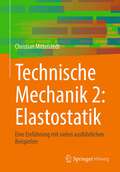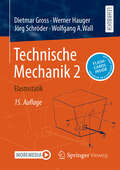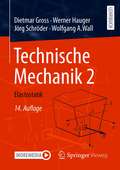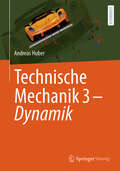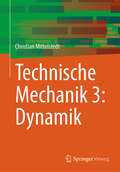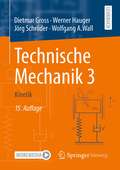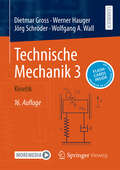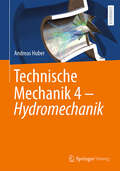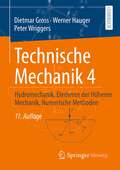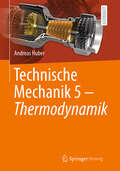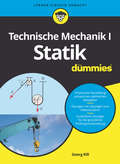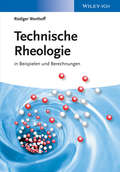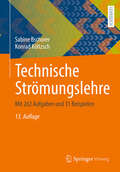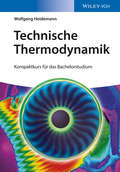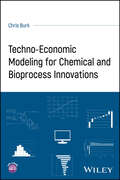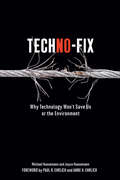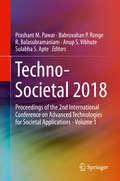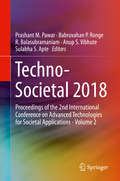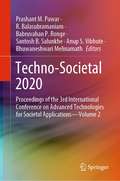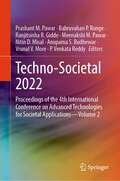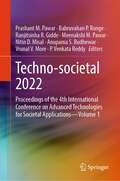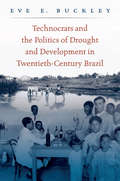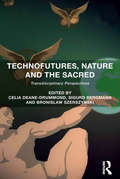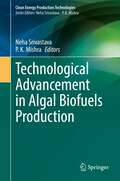- Table View
- List View
Technische Mechanik 2: Eine Einführung mit vielen ausführlichen Beispielen
by Christian MittelstedtDas vorliegende Buch folgt der klassischen Aufteilung der technischen Mechanik, so wie sie an Fachhochschulen und Universitäten in Deutschland gelehrt wird, und widmet sich der Elastostatik, d.h. der Ermittlung von Spannungen und von Deformationen in elastischen Körpern. Es ist das Ziel dieses Buchs, Studierenden den Einstieg in die Elastostatik auf anschauliche Art und Weise zu ermöglichen und sie in die Lage zu versetzen, ingenieurstechnische Aufgabenstellungen eigenständig zu formulieren und zu lösen. Hierzu hält das Buch eine Reihe von Beispielen bereit.Dieses Buch wendet sich an Studierende an Fachhochschule und Universitäten des Maschinenbaus, des Bauingenieurwesens, der Mechanik, aber auch aller anderen Studiengänge, in denen die Elastostatik eine Rolle spielt.Der InhaltLineare Elastizitätstheorie – Ebener Spannungszustand – Stäbe und Stabsysteme – Balken- Biegelinie – Querkraftschub – Torsion – Energiemethoden – Stabknicken
Technische Mechanik 2: Elastostatik
by Dietmar Gross Jörg Schröder Werner Hauger Wolfgang A. WallDer Band Elastostatik ist der zweite Teil des vierbändigen Lehrbuchs; er erscheint nun in der 15. Auflage. Ziel des didaktisch ausgefeilten Werkes ist es, das Verständnis der wesentlichen Grundgesetze der Mechanik zu vermitteln und die Fähigkeit zu entwickeln, mit Hilfe der Mechanik Ingenieurprobleme zu formulieren und selbständig zu lösen. Es wurde ein möglichst einfacher Zugang zur Mechanik gewählt. Der dargestellte Stoff orientiert sich am Umfang der Mechanikkurse an deutschsprachigen Hochschulen und ist für alle Bachelor-, Master- und Diplomstudiengänge hervorragend geeignet. Das Buch enthält zahlreiche durchgerechnete Beispiele. Die neue Auflage erhält zusätzlich zahlreiche Flashcards, die das Verständnis fördern und das Lernen erleichtern. Band 1 behandelt die Statik, Band 3 die Kinetik und Band 4 die Hydromechanik, Elemente der Höheren Mechanik und die Numerischen Methoden; geeignet für Ingenieurstudenten aller Fachrichtungen an Universitäten und Hochschulen. Auf Grund des großen Erfolges ist die Lehrbuchreihe mittlerweile auch in englischer Sprache als dreibändiges Werk "Engineering Mechanics" erschienen. Zusätzliche Fragen per App: Laden Sie die Springer-Nature-Flashcards-App kostenlos herunter und nutzen Sie exklusives Zusatzmaterial, um Ihr Wissen zu prüfen. Die freundliche Aufnahme, welche dieses Buch gefunden hat, macht eine Neuauflage erforderlich. Sie wurde genutzt, um eine Reihe von Verbesserungen und Ergänzungen vorzunehmen. Außerdem wurden Text und Abbildungen dem neuen Springer Layout angepasst, welches erlaubt, eine attraktive E-Book Variante bereitzustellen. Die Zielgruppen Das Buch wendet sich an Studierende der Ingenieurwissenschaften aller Fachrichtungen an Universitäten und Hochschulen.
Technische Mechanik 2: Elastostatik (Springer-lehrbuch Ser. #216)
by Dietmar Gross Jörg Schröder Werner Hauger Wolfgang A. WallDer Band Elastostatik ist der zweite Teil des vierbändigen Lehrbuchs; er erscheint nun in der 14. Auflage. Ziel des didaktisch ausgefeilten Werkes ist es, das Verständnis der wesentlichen Grundgesetze der Mechanik zu vermitteln und die Fähigkeit zu entwickeln, mit Hilfe der Mechanik Ingenieurprobleme zu formulieren und selbständig zu lösen. Es wurde ein möglichst einfacher Zugang zur Mechanik gewählt. Der dargestellte Stoff orientiert sich am Umfang der Mechanikkurse an deutschsprachigen Hochschulen und ist für alle Bachelor-, Master- und Diplomstudiengänge hervorragend geeignet. Das Buch enthält zahlreiche durchgerechnete Beispiele. Als Extras werden im Internet Applets zu Beispielen des Buches angeboten.Band 1 behandelt die Statik, Band 3 die Kinetik und Band 4 die Hydromechanik, Elemente der Höheren Mechanik und die Numerischen Methoden; geeignet für Ingenieurstudenten aller Fachrichtungen an Universitäten und Hochschulen. Auf Grund des großen Erfolges ist die Lehrbuchreihe mittlerweile auch in englischer Sprache als dreibändiges Werk "Engineering Mechanics" erschienen.Die ZielgruppenDas Buch wendet sich an Studierende der Ingenieurwissenschaften aller Fachrichtungen an Universitäten und Hochschulen.
Technische Mechanik 3 - Dynamik
by Andreas HuberDer dritte Band dieser Buchreihe beschäftigt sich mit der Dynamik, nachdem in den ersten beiden Bänden die Strukturmechanik behandelt wurde. Zunächst beschäftigt man sich mit den grundlegenden Bewegungsformen (Kinematik) bis man im Anschluss auf die Bewegungsursache und Kräfte (Kinetik) eingeht. Im Anschluss wird die Allgemeine Schwingungslehre behandelt, wodurch die Dynamik auf Grundlage der Technischen Mechanik abgeschlossen wäre. Dieses Buch zeichnet jedoch aus, dass auch noch auf die Grundlagen der Getriebelehre und Maschinendynamik sowie der Robotik eingegangen wird, denn auch diesen Kapiteln sind im Maschinenbau eng mit der Dynamik verbunden und erweitern die Dynamik um wichtige Gleichungen. Im letzten Abschnitt geht man spezifisch auf die FEM-Berechnung (nicht lineare- und lineare Dynamik) ein. Im Kapitel der Dynamik wird einem wieder speziell vor Augen geführt, dass man ohne die theoretischen Grundlagen keine Chance auf eine sinnvolle FEM-Berechnung hat, speziell wenn es um den Unterschied von Schwingungsanalysen: Frequenz-, Harmonische-, Modal- und transiente Analyse geht. Da in der Industrie diese FEM - Berechnungen unumgänglich verwendet werden müssen, werden zahlreiche Beispiele mittels SolidWorks (FEM und Motion) gelöst. Speziell geht man hier auf die Bewegungsanalyse in SolidWorks Motion und auf die dynamische FEM Berechnung (linear- und nicht linear) ein.
Technische Mechanik 3: Dynamik
by Christian MittelstedtDas vorliegende Buch folgt der klassischen Aufteilung der technischen Mechanik, so wie sie an Fachhochschulen und Universitäten in Deutschland gelehrt wird, und widmet sich der Dynamik, d.h. der Betrachtung von Bewegungen von Körpern unter Kräften. Es ist das Ziel dieses Buchs, Studierenden den Einstieg in die Dynamik auf anschauliche Art und Weise zu ermöglichen und sie in die Lage zu versetzen, ingenieurstechnische Aufgabenstellungen eigenständig zu formulieren und zu lösen. Hierzu hält das Buch eine Reihe von Beispielen bereit. Dieses Buch wendet sich an Studierende an Fachhochschulen und Universitäten des Maschinenbaus, des Bauingenieurwesens, der Mechanik, aber auch aller anderen Studiengänge, in denen die Dynamik eine Rolle spielt.
Technische Mechanik 3: Kinetik
by Dietmar Gross Jörg Schröder Werner Hauger Wolfgang A. WallDer Band Kinetik ist der dritte Teil der vierbändigen Lehrbuchreihe Technische Mechanik. Ziel des didaktisch ausgefeilten Werkes ist es, das Verständnis der wesentlichen Grundgesetze der Mechanik zu vermitteln und die Fähigkeit zu entwickeln, mit Hilfe der Mechanik Ingenieurprobleme zu formulieren und selbständig zu lösen. Es wurde ein möglichst einfacher Zugang zur Mechanik gewählt. Der dargestellte Stoff orientiert sich am Umfang der Mechanikkurse an deutschsprachigen Hochschulen und ist für alle Bachelor-, Master- und Diplomstudiengänge hervorragend geeignet. Das Buch enthält zahlreiche vollständig durchgerechnete Beispiele, mit deren Hilfe der Leser die Anwendung der Grundgesetze trainieren kann. Als Extras werden im Internet Applets zu Beispielen des Buches angeboten.Der Bestseller zur Technischen Mechanik erscheint jetzt in der aktualisierten, neu gestalteten 14. Auflage. In Kapitel 2, Kinetik eines Systems von Massenpunkten, und Kapitel 4, Prinzipien der Mechanik, wurden Verbesserungen und Ergänzungen vorgenommen. Band 1 behandelt die Statik, Band 2 die Elastostatik und Band 4 die Hydromechanik sowie Höhere Mechanik und die Numerischen Methoden. Ergänzt werden die Lehrbücher durch sorgfältig abgestimmte Aufgabenbände.Auf Grund des großen Erfolges ist die Lehrbuchreihe auch in englischer Sprache als dreibändiges Werk unter dem Titel "Engineering Mechanics" erschienen.
Technische Mechanik 3: Kinetik
by Dietmar Gross Jörg Schröder Werner Hauger Wolfgang A. WallDer Band Kinetik ist der dritte Teil der vierbändigen Lehrbuchreihe. Der Bestseller zur Technischen Mechanik erscheint nun in der 16. Auflage. Ziel des didaktisch ausgefeilten Werkes ist es, das Verständnis der wesentlichen Grundgesetze der Mechanik zu vermitteln und die Fähigkeit zu entwickeln, mit Hilfe der Mechanik Ingenieurprobleme zu formulieren und selbständig zu lösen. Es wurde ein möglichst einfacher Zugang zur Mechanik gewählt. Der dargestellte Stoff orientiert sich am Umfang der Mechanikkurse an deutschsprachigen Hochschulen und ist für alle Bachelor-, Master- und Diplomstudiengänge hervorragend geeignet. Das Buch enthält zahlreiche vollständig durchgerechnete Beispiele, mit deren Hilfe der Leser die Anwendung der Grundgesetze trainieren kann. Band 1 behandelt die Statik, Band 2 die Elastostatik und Band 4 die Hydromechanik sowie Höhere Mechanik und die Numerischen Methoden. Ergänzt werden die Lehrbücher durch sorgfältig abgestimmte Aufgabenbände. Auf Grund des großen Erfolges ist die Lehrbuchreihe auch in englischer Sprache als dreibändiges Werk „Engineering Mechanics" erschienen. Zusätzliche Fragen per App: Laden Sie die Springer-Nature-Flashcards-App kostenlos herunter und nutzen Sie exklusives Zusatzmaterial, um Ihr Wissen zu prüfen.
Technische Mechanik 4 – Hydromechanik
by Andreas HuberDer vierte Band dieser Buchreihe beschäftigt sich mit der Hydromechanik, nachdem in den ersten beiden Bänden die Strukturmechanik behandelt und im Dritten die Bewegung von starren Körpern untersucht wurde. Im vorliegenden Buch wird auf die Strömungsmechanik eingegangen, im Speziellen auf die Lehre von Flüssigkeiten, also der Hydrodynamik. Die Hydrodynamik beschäftigt sich mit den inkompressiblen Strömungen, im Gegensatz zur Aeromechanik. Zunächst beschäftigt man sich mit der Statik von Flüssigkeiten, der sogenannten Hydrostatik. Nachdem man die Grundlagen der Hydrostatik verstanden hat, kann man im Kapitel der vertiefenden Hydrostatik noch diverse Untersuchungen mittels partiellen Differentialgleichungen erlernen, nachdem man auf die Bewegung von Strömungen eingeht, im Kapitel der Hydrodynamik. Nach den grundlegenden Gleichungen der Hydrodynamik wie die Kontinuitätsgleichung und die Bewegungsgleichungen von Bernoulli und Euler geht man auf die vertiefende Hydromechanik ein. Es werden dort Methoden der Höheren Mathematik zur Untersuchung genutzt und auch die Kontinuumsmechanik bei Fluidteilchen angewendet, hin zu den wohl bekanntesten Gleichungen: die Navier-Stokes-Gleichungen. Horace Lamb sagte einmal: „Wenn ich in den Himmel kommen sollte, erhoffe ich Aufklärung über zwei Dinge: Quantenelektrodynamik und Turbulenz. Was den ersten Wunsch betrifft, bin ich ziemlich zuversichtlich.“ Um einen winzigen Funken Klarheit in die Turbulenz zu bringen, ist dieser das letzte Kapitel gewidmet. Im Speziellen wird im Laufe des Buches auf Strömungsanalysen mittels der CFD-gestützten Anwendung SolidWorks FlowSimulation eingegangen. Es werden zahlreiche Beispiele mittels CFD wie Kavitation, Überschallströmungen, parametrisierte Studien und Freie Oberflächen als auch Turbinen- und Schaufelräder simuliert.
Technische Mechanik 4: Hydromechanik, Elemente der Höheren Mechanik, Numerische Methoden (Springer-lehrbuch Ser.)
by Dietmar Gross Peter Wriggers Werner HaugerDieser vierte Band, Hydromechanik, Elemente der Höheren Mechanik, Numerische Methoden, schließt die Lehrbuchreihe Technische Mechanik ab. Der dargestellte Stoff orientiert sich an gängigen Kursen deutschsprachiger Hochschulen und ist für Bachelor-, Master- und Diplomstudiengänge hervorragend geeignet. In der 10. Auflage wurden deutliche Ergänzungen und eine Vielzahl von Verbesserungen vorgenommen. Das Werk enthält zahlreiche durchgerechnete Beispiele, die das Verständnis des Stoffes erleichtern. Band 1 behandelt die Statik, Band 2 die Elastostatik, Band 3 die Kinetik. Ergänzt werden die Lehrbücher durch sorgfältig abgestimmte Aufgabenbände.Die ZielgruppenDas Buch wendet sich an Studierende der Ingenieurwissenschaften aller Fachrichtungen an Universitäten und Hochschulen.
Technische Mechanik 5 - Thermodynamik
by Andreas HuberDieses Buch stellt den fünften Band der mehrteiligen Reihe zur Technischen Mechanik dar. Nachdem die zentralen Themengebiete der Mechanik: Stereostatik, Elastostatik, Dynamik und Hydromechanik behandelt wurden, wird hier die Thermodynamik und Wärmelehre abgehandelt. Arnold Sommerfeld sagte einmal über die Thermodynamik: „Thermodynamik ist ein komisches Fach. Das erste Mal, … versteht man nichts davon. Beim zweiten Durcharbeiten denkt man, man hätte nun alles verstanden, …. Das dritte Mal, wenn man den Stoff durcharbeitet, bemerkt man, dass man fast gar nichts davon versteht, aber man hat sich inzwischen so daran gewöhnt, dass es einen nicht mehr stört." Um das Fach verständlicher darzustellen, werden zahlreiche Beispiele mit Anwendungen aus der Realität untermauert und per Computergestützten Methoden gelöst, als Beispiel mittels Matlab, Excel, SolidWorks FEM und CFD. Dabei denken die meisten an siedendes Wasser, Dampf, Wärmedämmung, Isolierung, .... doch das ist bei Weitem nicht alles, was dieses Kapitel ausmacht. Zusätzlich werden Themen aus der Industrie: Dampfturbinen und die Grundlagen der Gasturbinen untersucht. All diese Kapitel zeigen die Bedeutung des Faches „Thermodynamik“. Man findet sie überall wieder: im Weltall beim Betracht der Entropie mithilfe des 2 Hauptsatzes, oder bei der Berechnung der Energien in einem System. Die Thermodynamik beschreibt die Tatsache, warum ein Ei auf dem Mount Everest schneller kocht, als bei Normalniveau, berechnet die Wärmemenge, die nassem Getreide zugeführt werden muss, um es zu trocknen und schafft den Übergang zwischen den nicht kompressiblen Fluiden (Wasser) zu den Gasen (vorerst mithilfe von Dampf) wobei es den Grundstein zur Behandlung der Aeromechanik aus dem 6. Band legt, worin die Gase genauer untersucht werden.
Technische Mechanik I Statik für Dummies (Für Dummies)
by Georg RillDieses Buch wurde bewusst kurz gehalten. Es deckt dennoch die Lehrinhalte »Technische Mechanik: Statik« ab, wie sie in der Regel in Bachelor-Studiengängen technischer Fachrichtungen vermittelt werden. Der Stoff wird überwiegend an Hand von Beispielen dargestellt. Am Ende jedes Kapitels laden Übungen zum Selbststudium ein. Und wem das noch nicht reicht, der findet für die Prüfungsvorbereitung noch ein Extra-Kapitel mit Übungen. Dieses Buch liefert Studierenden alles, was sie für die Statik-Prüfung brauchen.
Technische Rheologie in Beispielen und Berechnungen
by Rüdiger WorthoffIn der chemisch-technischen Industrie werden zunehmend Stoffe verarbeitet, die besondere viskoelastische Eigenschaften aufweisen und sich gegenüber "normalen" Newtonschen Flüssigkeiten außergewöhnlich verhalten. Hierzu gehören u.a. Lösungen und Schmelzen polymerer Medien, hochmolekulare Öle und verschiedene Suspensionen. Diese Substanzen stellen oft eine Herausforderung für die Förderung und Verarbeitung in Apparaten und Anlagen dar. Mit diesem Praktikerbuch gibt Rüdiger Worthoff dem Leser ein Werkzeug an die Hand, das es ihm ermöglicht, das Stoffverhalten in der Praxis mittels mathematischer Berechnungen einzuschätzen. Nach einer kurzen Einführung der theoretischen Grundlagen werden anhand von konkreten Fragen und Antworten die Probleme der modernen technischen Rheologie und deren Berechenbarkeit erörtert. Das Kapitel Rheometrie behandelt die Messtechniken und Bestimmung rheologischer Parameter. Die anderen Kapitel widmen sich den Strömungen in verschiedenen Geometrien. Die Vorstellung thermischer Effekte und Wärmeübertragungsprozesse in der Rheologie runden den Inhalt ab. Ein Glossar am Buchende sowie Verständnisfragen und Lösungen zu jedem Kapitel helfen das Gelernte zu vertiefen. Unentbehrlich für jeden Chemieingenieur, Verfahrenstechniker und Kunststofftechnologen in Studium und Beruf.
Technische Strömungslehre: Mit 262 Aufgaben und 31 Beispielen
by Sabine Bschorer Konrad KöltzschDieses leicht verständliche Lehr- und Übungsbuch vermittelt die wesentlichen Grundlagen der Strömungsmechanik und verzichtet dabei bewusst auf höhere Mathematik. Stattdessen fokussiert es sich auf eine sehr praxisorientierte Darstellung mit fast 300 durchgerechneten Beispielen und Aufgaben mit Lösungen. Auf nachvollziehbare Weise werden Ingenieuranwendungen erläutert und die Möglichkeit einer guten Lernerfolgskontrolle geboten. In der vorliegenden Auflage wurden neben allgemeinen Anpassungen vor allem das Kapitel zur Bernoulli-Gleichung für stationäre Strömungen sowie die zugehörigen Übungsaufgaben überarbeitet.
Technische Thermodynamik: Kompaktkurs für das Bachelorstudium
by Wolfgang HeidemannDas Lehrbuch umfasst den klassischen Stoff der technischen Thermodynamik in kompakter Form. In den ersten Kapiteln werden die thermodynamischen Grundbegriffe System, Zustandsgröße, Prozessgröße, thermisches Gleichgewicht und Temperatur eingeführt. Der anschließend diskutierte erste Hauptsatz als thermodynamisches Äquivalent der Energieerhaltung erlaubt in seinen unterschiedlichen Formulierungen die saubere Definition von Arbeit, Wärme, innerer Energie und Enthalpie. Das Modellsystem des idealen Gases ermöglicht die Ableitung von thermischen und kalorischen Zustandsgleichungen und führt hin zum zweiten Hauptsatz der Thermodynamik, der das Prinzip der Irreversibilität thermodynamischer Prozesse zum Ausdruck bringt und den Begriff der Entropie motiviert. Die folgenden Kapitel befassen sich mit thermodynamischen Kreisprozessen mit und ohne Phasenänderungen unter Verwendung idealer und realer Gase. Das Buch schließt mit einer Einführung in Gasgemische und die Thermodynamik chemischer Reaktionen, die typischerweise in großtechnischen Prozessen auftreten. Das Buch ist vorlesungsbegleitend und zum Selbststudium geeignet: In jedem Kapitel folgt auf die Darstellung der Grundlagen eine auch zum Nachschlagen nutzbare, ausführliche Zusammenfassung der wichtigsten Sachverhalte und eine Aufgabensammlung. Diese enthält Verständnisfragen im Multiple-Choice-Stil sowie nach Schwierigkeitsgrad gestaffelte Rechenaufgaben. Für das erfolgreiche Selbststudium sind alle Aufgaben mit zweistufigen Lösungshinweisen versehen: im ersten Schritt unterstützen vertiefende Fragen bei der Erarbeitung des Lösungswegs, im zweiten Schritt werden konkrete Hilfestellungen in Form von zu verwendenden Formeln oder Sachverhalten angegeben.
Techno-Economic Modeling for Chemical and Bioprocess Innovations
by Chris BurkBuild spreadsheet-based techno-economic models to understand factors driving economic value Techno-economic modeling examines how technical and financial parameters influence the economic value of a technology at the commercial scale. Techno-Economic Modeling for Chemical and Bioprocess Innovations is a practical guide to building spreadsheet-based techno-economic models and using them to make better decisions on the road to market. Inside, this book: Explains the role of techno-economic modeling in advancing new technologies toward commercialization.Presents spreadsheet best practices that form the foundation for effective and efficient techno-economic modeling.Teaches how to combine process modeling, equipment sizing, and cost estimation in a cohesive and usable spreadsheet model.Introduces techniques for analyzing model results to assess economic viability, quantify uncertainty, inform R&D priorities, and improve stakeholder communication.Provides practical Excel and VBA examples, with two complete sample models available online. This book equips readers with the tools to combine science, engineering, and cost estimation. It is an essential resource for chemical and bioprocess engineers, including academics, startup teams, and advanced students working to bring innovations into the world.
Techno-Fix: Why Technology Won't Save Us or the Environment
by Michael Huesemann Joyce HuesemannNanotechnology! Genetic engineering! Miracle Drugs! We are promised that new technological developments will magically save us from the dire consequences of the 300-year fossil-fueled binge known as modern industrial civilization, without demanding any fundamental changes in our behavior. There is a pervasive belief that technological innovation will enable us to continue our current lifestyle indefinitely and will prevent social, economic and environmental collapse. Techno-Fix shows that negative unintended consequences of technology are inherently predictable and unavoidable, techno-optimism is completely unjustified, and modern technology, in the presence of continued economic growth, does not promote sustainability, but hastens collapse. The authors demonstrate that most technological solutions to social and technology-created problems are ineffective. They explore the reasons for the uncritical acceptance of new technologies, show who really controls the direction of technological change, and then advocate extensive reform.This comprehensive exposé is a powerful argument for why we can and should put the genie back in the bottle. An insightful and powerful critique, it is required reading for anyone who is concerned about blind techno-optimism and believes that the time has come to make science and technology more socially and environmentally responsible.For more information, please visit technofix.org .
Techno-Societal 2018: Proceedings of the 2nd International Conference on Advanced Technologies for Societal Applications - Volume 1
by Prashant M. Pawar Babruvahan P. Ronge R. Balasubramaniam Anup S. Vibhute Sulabha S. ApteThis book, divided in two volumes, originates from Techno-Societal 2018: the 2nd International Conference on Advanced Technologies for Societal Applications, Maharashtra, India, that brings together faculty members of various engineering colleges to solve Indian regional relevant problems under the guidance of eminent researchers from various reputed organizations.The focus is on technologies that help develop and improve society, in particular on issues such as the betterment of differently abled people, environment impact, livelihood, rural employment, agriculture, healthcare, energy, transport, sanitation, water, education. This conference aims to help innovators to share their best practices or products developed to solve specific local problems which in turn may help the other researchers to take inspiration to solve problems in their region. On the other hand, technologies proposed by expert researchers may find applications in different regions. This offers a multidisciplinary platform for researchers from a broad range of disciplines of Science, Engineering and Technology for reporting innovations at different levels.
Techno-Societal 2018: Proceedings of the 2nd International Conference on Advanced Technologies for Societal Applications - Volume 2
by Prashant M. Pawar Babruvahan P. Ronge R. Balasubramaniam Anup S. Vibhute Sulabha S. ApteThis book, divided in two volumes, originates from Techno-Societal 2018: the 2nd International Conference on Advanced Technologies for Societal Applications, Maharashtra, India, that brings together faculty members of various engineering colleges to solve Indian regional relevant problems under the guidance of eminent researchers from various reputed organizations.The focus is on technologies that help develop and improve society, in particular on issues such as the betterment of differently abled people, environment impact, livelihood, rural employment, agriculture, healthcare, energy, transport, sanitation, water, education. This conference aims to help innovators to share their best practices or products developed to solve specific local problems which in turn may help the other researchers to take inspiration to solve problems in their region. On the other hand, technologies proposed by expert researchers may find applications in different regions. This offers a multidisciplinary platform for researchers from a broad range of disciplines of Science, Engineering and Technology for reporting innovations at different levels.
Techno-Societal 2020: Proceedings of the 3rd International Conference on Advanced Technologies for Societal Applications—Volume 2
by Prashant M. Pawar Babruvahan P. Ronge R. Balasubramaniam Anup S. Vibhute Santosh B. Salunkhe Bhuwaneshwari MelinamathThis book, divided in two volumes, originates from Techno-Societal 2020: the 3rd International Conference on Advanced Technologies for Societal Applications, Maharashtra, India, that brings together faculty members of various engineering colleges to solve Indian regional relevant problems under the guidance of eminent researchers from various reputed organizations.The focus of this volume is on technologies that help develop and improve society, in particular on issues such as advanced and sustainable technologies for manufacturing processes, environment, livelihood, rural employment, agriculture, energy, transport, sanitation, water, education. This conference aims to help innovators to share their best practices or products developed to solve specific local problems which in turn may help the other researchers to take inspiration to solve problems in their region. On the other hand, technologies proposed by expert researchers may find applications in different regions. This offers a multidisciplinary platform for researchers from a broad range of disciplines of Science, Engineering and Technology for reporting innovations at different levels.
Techno-Societal 2022: Proceedings of the 4th International Conference on Advanced Technologies for Societal Applications—Volume 2
by Prashant M. Pawar Babruvahan P. Ronge Ranjitsinha R. Gidde Meenakshi M. Pawar Nitin D. Misal Anupama S. Budhewar Vrunal V. More P. Venkata Reddy“This two-volume book originates from Techno-Societal 2022, the 4th International Conference on Advanced Technologies for Societal Applications held in Maharashtra, India. The conference brought together faculty members from various engineering colleges and eminent researchers from reputed organizations to solve Indian regional relevant problems.The focus of the Volume-I is on technologies that help develop and improve society, with a particular emphasis on issues such as advanced and sustainable technologies for water, energy, transportation, housing, and sanitation. Additionally, the book covers advances in pharmacy, nutraceuticals, and traditional medicines, as well as chemical and physical processes.The Volume-II covers deployable environment or health care technologies, mechatronics, micro-nano related technologies for bio and societal applications, and advanced assessment of employees and employment sectors.The conference aims to provide a platform for innovators to share their best practices or products developed to solve specific local problems, which in turn may inspire other researchers to solve problems in their own regions. Expert researchers also propose technologies that may find applications in different regions, providing a multidisciplinary platform for researchers from a broad range of disciplines of science, engineering, and technology to report innovations at different levels.”
Techno-societal 2022: Proceedings of the 4th International Conference on Advanced Technologies for Societal Applications—Volume 1
by Prashant M. Pawar Babruvahan P. Ronge Ranjitsinha R. Gidde Meenakshi M. Pawar Nitin D. Misal Anupama S. Budhewar Vrunal V. More P. Venkata Reddy“This book, divided into two volumes, originates from Techno-Societal 2022: the 4th International Conference on Advanced Technologies for Societal Applications, Maharashtra, India. The conference brings together faculty members from various engineering colleges to solve relevant regional problems in India, under the guidance of eminent researchers from various reputed organizations.The focus of Volume - I is on technologies that help develop and improve society, with particular emphasis on sensor and ICT-based technologies for the betterment of people, technologies for agriculture and healthcare, micro and nano technological applications, as well as Artificial Intelligence and Big Data.Volume - II delves into commercially successful rural and agricultural technologies, engineering for rural development, ICT-based societal applications, manufacturing and fabrication processes for societal applications, material science & composites, and sensor, image, and data-driven societal technologies.This conference aims to provide a platform for innovators to share their best practices or products developed to solve specific local problems, which in turn may inspire other researchers to solve similar problems in their regions. Additionally, technologies proposed by expert researchers may find applications in different regions, making it a multidisciplinary platform for reporting innovations at different levels in Science, Engineering, and Technology.”
Technocrats and the Politics of Drought and Development in Twentieth-Century Brazil
by Eve E. BuckleyEve E. Buckley's study of twentieth-century Brazil examines the nation's hard social realities through the history of science, focusing on the use of technology and engineering as vexed instruments of reform and economic development. Nowhere was the tension between technocratic optimism and entrenched inequality more evident than in the drought-ridden Northeast sertao, plagued by chronic poverty, recurrent famine, and mass migrations. Buckley reveals how the physicians, engineers, agronomists, and mid-level technocrats working for federal agencies to combat drought were pressured by politicians to seek out a technological magic bullet that would both end poverty and obviate the need for land redistribution to redress long-standing injustices. Scientists planned and oversaw huge projects including dam construction, irrigation for small farmers, and public health initiatives. They were, Buckley shows, sincerely determined to solve the drought crisis and improve the lot of poor people in the sertao. Over time, however, they came to the frustrating realization that, despite technology's tantalizing promise of an apolitical means to end poverty, political collisions among competing stakeholders were inevitable. Buckley's revelations about technocratic hubris, the unexpected consequences of environmental engineering, and constraints on scientists as agents of social change resonate with today's hopes that science and technology can solve society's most pressing dilemmas, including climate change.
Technocrats and the Politics of Drought and Development in Twentieth-Century Brazil
by Eve E. BuckleyEve E. Buckley’s study of twentieth-century Brazil examines the nation’s hard social realities through the history of science, focusing on the use of technology and engineering as vexed instruments of reform and economic development. Nowhere was the tension between technocratic optimism and entrenched inequality more evident than in the drought-ridden Northeast sertão, plagued by chronic poverty, recurrent famine, and mass migrations. Buckley reveals how the physicians, engineers, agronomists, and mid-level technocrats working for federal agencies to combat drought were pressured by politicians to seek out a technological magic bullet that would both end poverty and obviate the need for land redistribution to redress long-standing injustices.
Technofutures, Nature and the Sacred: Transdisciplinary Perspectives
by Celia Deane-Drummond Sigurd Bergmann Bronislaw SzerszynskiThe capacity of human beings to invent, construct and use technical artifacts is a hugely consequential factor in the evolution of society, and in the entangled relations between humans, other creatures and their natural environments. Moving from a critical consideration of theories, to narratives about technology, and then to particular and specific practices, Technofutures, Nature and the Sacred seeks to arrive at a genuinely transdisciplinary perspective focusing attention on the intersection between technology, religion and society and using insights from the environmental humanities. It works from both theoretical and practical contexts by using newly emerging case studies, including geo-engineering and soil carbon technologies, and breaks open new ground by engaging theological, scientific, philosophical and cultural aspects of the technology/religion/nature nexus. Encouraging us to reflect on the significance and place of religious beliefs in dealing with new technologies, and engaging critical theory common in sociological, political and literary discourses, the authors explore the implicit religious claims embedded in technology.
Technological Advancement in Algal Biofuels Production (Clean Energy Production Technologies)
by P. K. Mishra Neha SrivastavaThis edited book presents all feasible approaches to improve technology of algal biofuels production at both qualitative and quantitative front. The book’s focus in on enhancing mass scale production of algae based biofuels by addressing technological issues and filling the existing gaps to make it smooth for practical as well as commercial implementation. The book also explores in depth analysis of various issues other than technology and related to improve technological significance for practical biofuels production from algae. Low cost strategies and higher mass production is one of the most sounding agenda of the book. The book also evaluates enlighten various sustainable algal biofuels options which are close towards commercial application along with their green future prospect. Societal and environment friendly approach even for commercial application has also been discussed in book. This is a useful reading material for researchers and students of biofuels and reneable energy.
